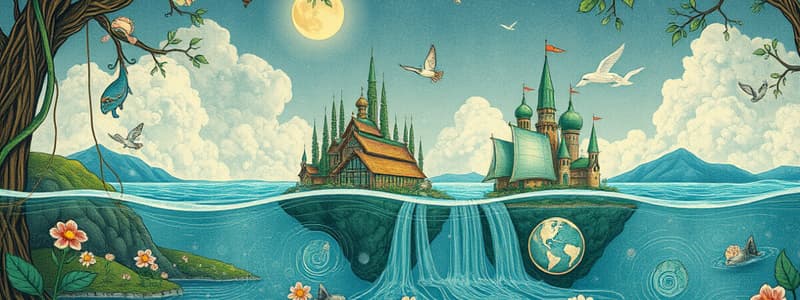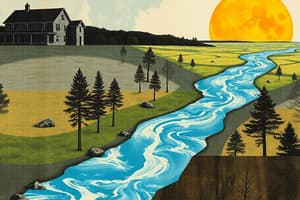Podcast
Questions and Answers
What is an aquifer?
What is an aquifer?
- A body of rock or sediment that stores groundwater (correct)
- The rise and fall of the ocean level
- The collection of water
- Water vapor entering the atmosphere
What is the water cycle?
What is the water cycle?
A process that keeps our water continuously filtered
What does evaporation refer to?
What does evaporation refer to?
Water vapor entering the atmosphere
What happens during condensation?
What happens during condensation?
What is precipitation?
What is precipitation?
What does runoff refer to?
What does runoff refer to?
What is infiltration?
What is infiltration?
What is transpiration?
What is transpiration?
What powers the water cycle?
What powers the water cycle?
What is salinity?
What is salinity?
What causes tides?
What causes tides?
What are the normal paths of cold currents?
What are the normal paths of cold currents?
What are the normal paths of warm currents?
What are the normal paths of warm currents?
What is the effect of temperature and salinity on ocean water?
What is the effect of temperature and salinity on ocean water?
The ocean waters are _____ and therefore, the water is _____ than fresh water.
The ocean waters are _____ and therefore, the water is _____ than fresh water.
Fresh water in rivers is _____ and therefore, the water is _____ than ocean water.
Fresh water in rivers is _____ and therefore, the water is _____ than ocean water.
Why is the salinity of ocean water relatively balanced?
Why is the salinity of ocean water relatively balanced?
Flashcards are hidden until you start studying
Study Notes
Key Concepts of Earth's Water Cycle
-
Aquifer: A geological formation that holds groundwater and allows its movement, essential for water supply and ecological health.
-
Water Cycle: A continuous process filtering water through various stages, ensuring constant circulation in nature.
-
Collection: Accumulation of water in various forms such as lakes, rivers, or reservoirs.
-
Evaporation: Transformation of water from liquid to vapor, leading to water vapor entering the atmosphere.
-
Condensation: Process where water vapor cools and converts into liquid droplets, crucial for cloud formation.
-
Precipitation: The falling of water droplets from clouds in various forms, including rain, snow, sleet, or hail.
-
Runoff: Excess water that travels over land surfaces, leading to bodies of water, crucial for replenishing lakes and rivers.
-
Infiltration: The downward movement of water into the soil, contributing to groundwater recharge.
-
Transpiration: Water vapor released from plants and trees, contributing to atmospheric moisture.
Factors Influencing Ocean Salinity and Currents
-
Sun: The source of solar radiation that drives the water cycle, essential for evaporation.
-
Salts in the Ocean: Include compounds such as chloride, sodium, and sulfate, impacting marine chemistry.
-
Sources of Ocean Salts: Entry through natural processes like hydrothermal vents, acid rain, weathering erosion, and underwater volcanic activity.
-
Salinity: Concentration of dissolved salts in ocean water, influencing marine life and water density.
Wave Dynamics
-
Wave: A manifestation of energy traveling across the water's surface, characterized by an up-and-down motion.
-
Causes of Waves: Primarily formed by wind interactions with water surfaces, which can vary the size based on wind strength.
-
Wind: The driving force behind surface currents, affecting ocean behaviors.
-
Density: Factors like temperature and salinity affect ocean water density, contributing to the generation of deep ocean currents.
Ocean Currents
-
Cold Currents Behavior: Typically move towards warmer water, influencing marine climates.
-
Warm Currents Behavior: Also trend towards warmer areas, impacting global weather patterns.
Tides and Erosion
-
Tides: The natural rise and fall of ocean water levels caused by gravitational forces of the moon and sun.
-
Coastal Erosion: Processes like tides and waves contribute to the erosion of beaches and shores, reshaping coastal landscapes.
Freshwater vs. Saltwater
-
Salinity Comparisons: Ocean water is saltier and denser compared to freshwater found in rivers and lakes.
-
Freshwater Characteristics: Rivers and lakes have lower salinity and density in contrast to oceanic waters, playing crucial roles in local ecosystems.
Water Distribution on Earth
-
Water Composition: Earth is composed of 71% water, with 97% being saltwater and only 3% freshwater.
-
Saltwater Breakdown: Oceanic regions from smallest to largest include the Arctic, Southern, Indian, Atlantic, and Pacific Oceans.
-
Freshwater Breakdown: Freshwater sources are primarily glaciers, groundwater, lakes & rivers, atmospheric vapor, and swamps.
Impact of Evaporation on Precipitation
-
Evaporation Effects: Increased evaporation correlates with increased precipitation, indicating a cyclical relationship.
-
Decreased Evaporation: Lower evaporation rates lead to decreased precipitation, highlighting the delicate balance of the water cycle.
Studying That Suits You
Use AI to generate personalized quizzes and flashcards to suit your learning preferences.




